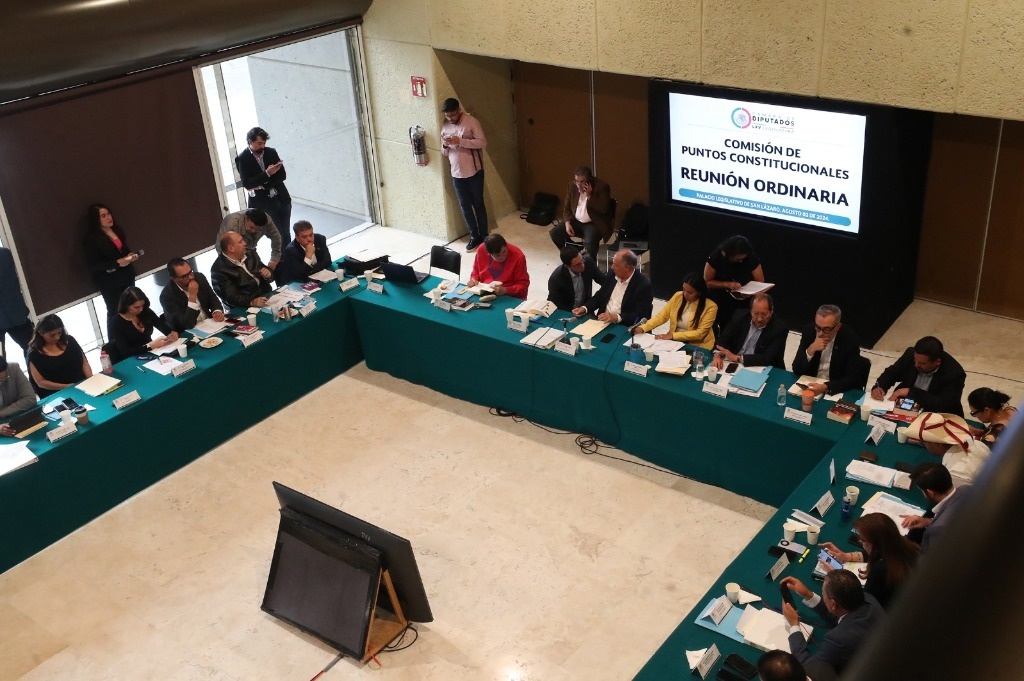Mexico City. The Constitutional Affairs Committee of the Chamber of Deputies approved this Friday two more rulings of the so-called “Plan C” of President Andrés Manuel López Obrador, through which it is established that no public servant may have a higher salary than that of the head of the Executive, and which allows the State to “retake” the management of the country’s railroads, to promote the passenger transportation service by rail.
During its session today – interrupted for a few minutes due to the erroneous activation of the seismic alert – the aforementioned legislative body discussed the republican austerity initiative presented by López Obrador, which proposed raising to constitutional rank that the monthly salary received by the president, of 136,700 pesos per month, be the salary cap for the rest of the public servants.
In the text of the ruling – through which six articles of the Magna Carta were modified – it was specifically mentioned that the remuneration of “the Ministers of the Supreme Court, the Circuit Magistrates, the District Judges, the Magistrates of the Judicial Disciplinary Tribunal, the Electoral Magistrates and other personnel of the Judicial Branch of the Federation, may not be greater than that established for the President of the Republic.”
Another point of the initiative established that “no type of unnecessary goods or services, retirement pensions, special retirement regimes, individual or collective separation, special savings accounts, medical expense insurance or private life insurance or others that are not provided for in a general provision, collective contract or general working conditions may be acquired or contracted with public resources.”
During the debate in the committee, legislators from all parties stated that they would vote in favor of the proposal, with the exception of the PAN, which through the voice of deputy Jorge Triana pointed out that the total expenses associated with the work of the President of the Republic actually amount to “almost half a million pesos per month.”
He also pointed out that the López Obrador government “fell far from complying with austerity” because –he said- it exceeded four times what it had committed to spend on current expenses and hiring new personnel.
Four reservations were presented to the ruling, of which only the one made by Deputy Ismael Brito (Morena) was accepted, who requested to specify that the comprehensive remuneration of the President of the Republic “includes all payments in cash and in kind and may not exceed the equivalent of 73.04 times the annual value of the Measurement and Update Unit,” and not 73 times, as the text originally stated.
After a discussion lasting more than two hours, the initiative was approved unanimously with 36 votes in favour.
Boost to passenger trains
Today’s session also approved the ruling that authorizes the federal Executive to “retake” control of the country’s railways, with the aim of “granting assignments to public companies or concessions to private parties, to use the railways and provide the service of passenger transportation by rail.”
In one of the initiative’s transitory provisions, it was also mentioned that “individuals who have concessions to provide freight rail transport services may obtain concessions to provide passenger transport services,” with the clarification that the latter will have preference.
The text of the ruling emphasized that, although “rail transport was crucial to Mexico’s development in the late 19th and early 20th centuries,” in 1995 the regime of exclusive state participation in railways was replaced in order to allow private participation through concessions.
“Since its privatization until 2017, the railways only increased by 23 kilometers, for a total length of 26,914 kilometers,” which relegated the train to a very marginal form of passenger transport, he lamented.
As has occurred with other presidential reform proposals, practically all parties announced that they would vote in favor, except for the National Action Party. Deputy Héctor Saúl Téllez indicated that the PAN would not support the initiative because it would open the door to the Armed Forces taking over a state-owned company that administers passenger trains, which would imply the “militarization of a civil service.”
He also argued that the Maya Train and other infrastructure projects of the current government have been built at a high price, and that this type of initiative “creates serious uncertainty for investment” and “puts at risk the concessions already granted to private parties.”
Despite opposition criticism, Morena accepted a reservation to specify that the ruling would allow the State to “retake” control over the railways. The initiative was approved by 30 votes in favor, 8 against and one abstention.
At the end of the session, the president of the Constitutional Affairs Committee, Juan Ramiro Robledo (Morena), said that since the discussion of each opinion of the “Plan C” –six in total, between Thursday and Friday—has taken two hours on average, he will propose to the coordinators of the parliamentary groups that the analysis of the next five initiatives be divided into two sessions.
In this way, two or three of the next resolutions would be debated on Friday, August 9, and the remaining ones in the following session, in order to “work more quickly.” The possible new schedule, already with these adjustments, would be announced next Monday.
#Deputies #approve #resolutions #austerity #transport #Plan
– 2024-08-10 05:35:48
